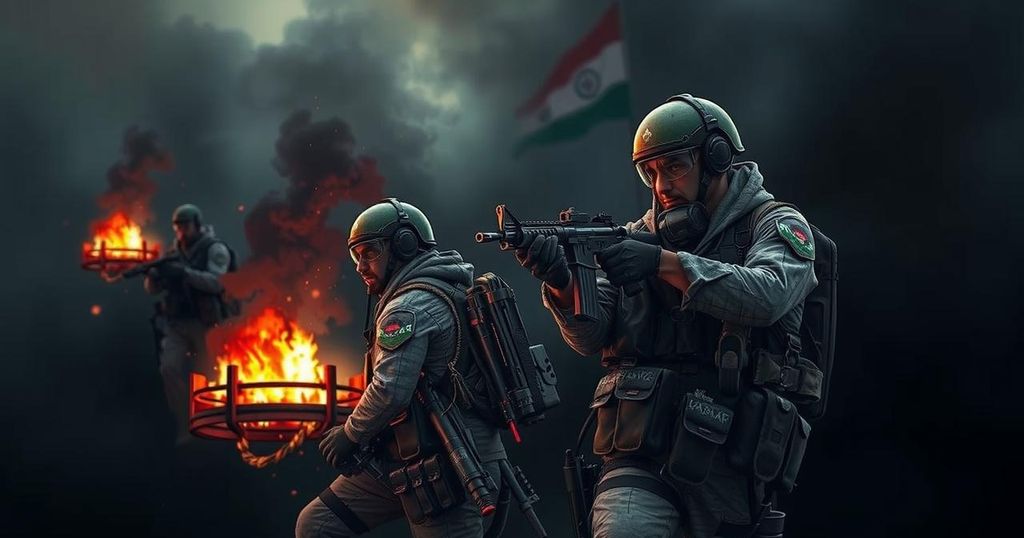Aleppo’s Capture Reveals New Dynamics in Syrian Conflict Amid Shifting Alliances

A surprise offensive by Syrian rebels has resulted in their capture of Aleppo, showing a significant shift in power dynamics. Factors contributing to the rebels’ success include weakened Russian support due to military focus on Ukraine and the degradation of Iranian proxies from Israeli airstrikes, which have collectively undermined President Assad’s regime.
Recent developments in Syria have seen a surprise offensive by rebel forces lead to the capture of Aleppo, a city that had been under the Syrian government’s control since 2016. The offensive highlights a shift in the power dynamics within the region, influenced by the ongoing wars in Ukraine, Lebanon, and broader Middle Eastern tensions. The focus of Russian military resources elsewhere has weakened the support for President Bashar al-Assad’s regime, whilst Iranian proxies have suffered significant losses due to Israeli airstrikes, all contributing to this unexpected rebel success.
Historically, Aleppo was a focal point of intense conflict during the Syrian civil war from 2012 to 2016. The city experienced widespread destruction and significant bloodshed before government forces took control with Russian backing. While the Idlib region remained predominantly outside of Assad’s authority, recent military actions signify a dramatic resurgence of rebel influence, calling into question previously assumed Assad-led stability. The sudden vulnerability of his forces raises essential inquiries regarding the shifts in military backing and strategy affecting the Syrian landscape.
The Syrian regime’s limitations are chiefly attributable to Russia’s redirected military focus towards the Ukraine conflict. Reports indicate the withdrawal of critical missile systems from Syria in favor of operations against Ukraine, diminishing Russia’s capability to sustain its support for Assad. Consequently, the recent Russian airstrikes in rebel-held regions, while devastating, have not effectively thwarted the offensive from the insurgent side. This weakening of military resources and strategic attention indeed appears to have empowered rebel forces in Aleppo.
Furthermore, the ongoing Israeli military actions against Iranian positions in Syria, particularly against Hezbollah, have further complicated the dynamics on the ground. Experts suggest that the loss of efficacy among Iranian proxies directly affects the Assad regime’s ability to respond robustly. “Iran proxies have been substantially degraded, and this has an unquestionable impact on the Assad regime’s ground forces,” emphasized Burcu Ozcelik, a Middle East expert from the Royal United Services Institute. The withholding of Iranian military support potentially curtails opportunities for a swift regime resurgence.
The nature of the conflict remains unresolved, and the excitement surrounding the surprise offensive breaches the volatile guise of stability previously experienced under Assad’s rule. Additionally, the HTS group’s planning and execution signify a shift that had awaited opportunity, yielding startling military effectiveness. The reinstatement of conflict within Aleppo presents a chilling reminder of the fragile state of peace that persists in the region, ultimately demonstrating the persistent volatility and complex entanglements characterizing the Middle East’s modern geopolitical setting.
The ongoing Syrian conflict has seen numerous shifts in power and control, primarily marked by the struggle between government forces led by President Assad and various rebel factions. Aleppo, one of the country’s most significant cities, has been emblematic of this struggle. Its capture in the past had marked a turning point for Assad’s regime, with heavy assistance from Russian military forces. However, increasing regional conflicts, including Russia’s focus on Ukraine and Israeli air operations against Iranian proxies, have altered the capacity of Assad’s regime to maintain dominance in the region. The presence of rebel groups, particularly HTS in Idlib, emphasizes the persistent, unresolved tensions that continue to characterize the Syrian theater.
The recent capture of Aleppo by Syrian rebels underscores a significant shift in the regional power dynamics, reflecting the impact of international conflicts and shifting military alliances. The withdrawal of Russian support and the degradation of Iranian proxies have opened a window of opportunity for rebel forces, highlighting the Syrian regime’s vulnerabilities. As conflicts evolve, the potential for further escalation remains high, posing ongoing challenges to the stability of the region. The developments in Syria exemplify the complex interplay of military strategy and geopolitical considerations impacting the Middle East today.
Original Source: www.theguardian.com






